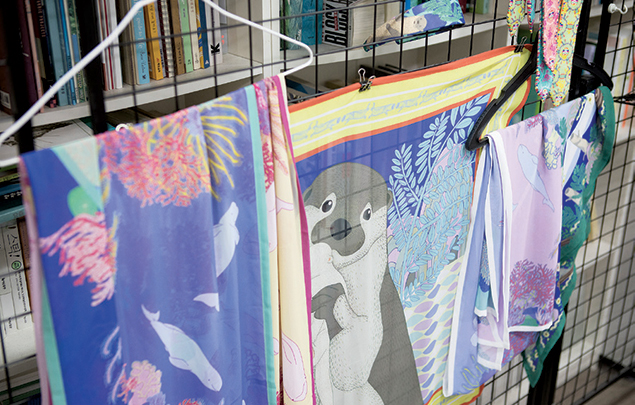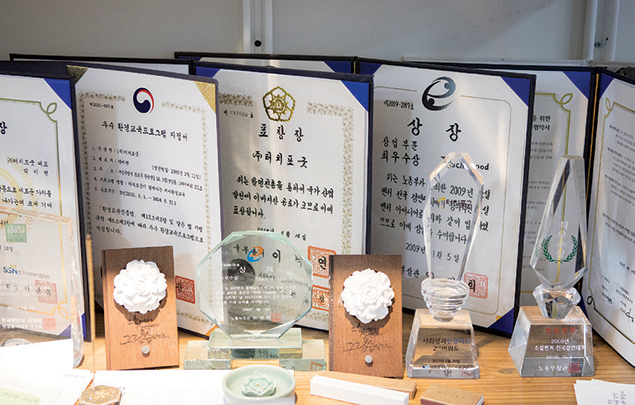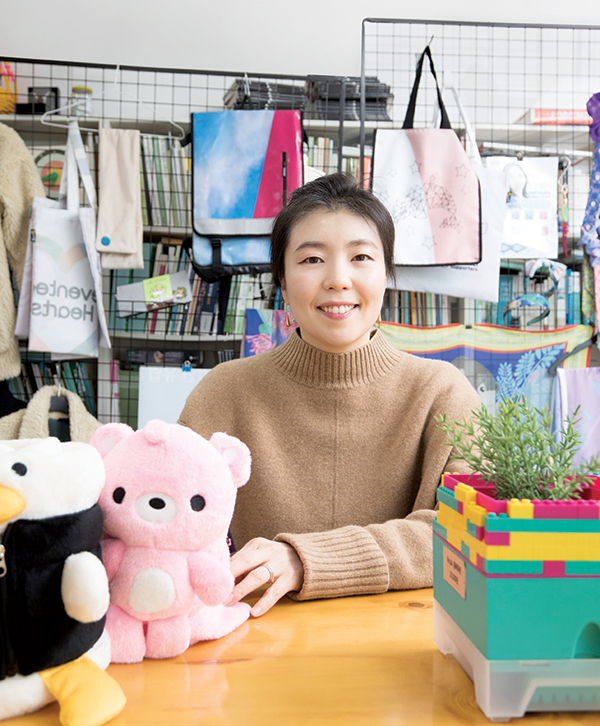-
 2023. February VOL. 659
2023. February VOL. 659

South Korea ranks high globally in the recycling rate, but in reality, resources are not fully recycled as the statistics indicate. Although households make daily efforts to carefully sort out waste, the majority of their waste gets sent to landfills and stay there for hundreds of years. The upcycling company Touch for Good breathes new life and value in the waste produced for it to serve a new purpose in our everyday life. The first upcycled product was an eco-bag made of waste banners.
“A large number of banners are made across the country and most of them are used only for a short period of time before they are thrown away and burned. Carbon dioxide and dioxin, emitted when used banners are burned, are major causes of air pollution, and it takes a significant amount of cost to dispose of the banners. So I thought it would make a small but meaningful difference in protecting the environment if these waste banners could be recycled.”
Still in college, Park and several fellow college students worked hard to make a bag out of used banners, which was the inception of Touch for Good, a social enterprise officially launched in October 2008. Park thought resources were too quickly consumed and thrown away in today’s society and wanted to recycle these waste resources into products people can use, hoping that it would touch the hearts of consumer. In this sense, the company was named ‘Touch for Good’ and she has held on to the vision of rediscovering the value of things that have been thrown away for the past 15 years.
 The scarf made of fabric recycled from PET bottles shows otters swimming happily in the Hangang River.
The scarf made of fabric recycled from PET bottles shows otters swimming happily in the Hangang River. Plaques and award certificates Touch for Good has earned in recognition of its contribution to transforming thrown-away resources into useful items
Plaques and award certificates Touch for Good has earned in recognition of its contribution to transforming thrown-away resources into useful items
The eco-bag made out of recycled banners is what has lead Touch for Good to establish itself as a solid recycling company. Used banners are collected and washed with eco-friendly detergent before they go through a strict process and get reborn as bags. The entire process including sewing is done 100% by hand which ensures high quality and creates a one and only design for each bag. Park takes pride in the fact that the bag is a future-oriented product that embodies the environmental value involved in the whole process from design to the end result. When they first started their business, they faced much skepticism from those who overlooked them as being too young to succeed. But now, a growing number of corporations donate their used banners and in return, want to buy upcycled products from Touch for Good, revealing that more and more people care about the environment and the way people look at environmental issues has changed a lot.
“During the last election, the company created a limited edition lineup by combining the election banners for different candidates and made lamps out of trees discarded after they were used for the opening and closing ceremonies of the Pyeongchang Winter Olympics. In addition, lipsticks were transformed into crayons and threads made from PET bottles were woven into scarves.”
Starting with bags made out of used banners, Touch for Good has continued to expand the scope of its products including scarves, pouches and blankets. It is currently using over 150 materials including glass, metals and wood to make its products, while it is working on building a database on 700 resources that can be upcycled. It is also actively involved in conducting research and development on technologies to recycle waste that is currently not recycled as well as offering urban environmental education for children and teenagers.
“We started our research on plastic in 2004. Back then, there were only three kinds of fabric made of recycled PET bottles, but now we have 50. It shows how drastically corporate investment in environment protection has increased and how fast science and technology is advancing as people become increasingly interested in environmental issues and aware of the threats plastics pose to the environment.”
Park says that she is happy with the remarkable progress compared to ten years ago, although people tend to be concerned mainly about plastic when other types of waste also present serious problems.
 CEO Mi-hyeon Park at Touch for Good that rediscovers the value of trash.
CEO Mi-hyeon Park at Touch for Good that rediscovers the value of trash.
There is a common proverb about trash we have all heard: ‘One person’s trash is another person’s treasure.’ In other words, some people only throw things away while some pick them up. Having collected waste and recycled it for the past 15 years, Touch for Good has the ultimate goal of ensuring that those who throw away trash are the ones who recycle it, thereby practicing upcycling in a more responsible and value-creating way. To this end, the company is working in earnest on ‘Rethink Solution’, a project launched to help companies recycle waste that they inevitably generate in the course of conducting their business activities.
“Rethink is attributed to the act of recycling trash that is thrown away. Recycled banners are turned into bags through a design process, which then are sold to consumers. On the other hand, rethink products can reflect a value or a cause that a company intends to pursue in the product design. In a sense, the products complete a story of their own. Recently, blankets used on Korean Air flights were made into hot packs that can be used semi-permanently. The hot packs were donated to residents of dosshouses. Patient gowns were recycled into pouches for sanitary pads, which were also donated. These upcycled products are particularly memorable because they are intended to not only promote a sharing spirit but also deliver a warm corporate image to consumers.”
Touch for Good focuses on collecting used products and transforming them into new items. For example, the company worked with Hyundai Department Store on an environmental campaign in which it collected waste plastic from customers and used it to make flower pots as part of environmental education for elementary school students. It has recycled a total of 10 to 12 tons of resources each year, and continues to expand the scope of its business. A few years ago, the MBC TV show, [Inifinite Challenge] showed how used banners were recycled into bags and pouches for only three seconds, and these items all sold out. Assured that even small changes or incidents can create the butterfly effect by sparking people’s interest in the environment, Park hopes that more and more people become aware that ‘trash is resources’ being thrown away.
※ This interview was conducted in accordance with the COVID-19 safety rules.
